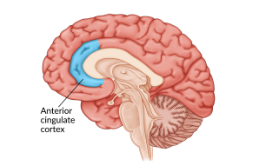
What is Anterior Cingulate?
The anterior cingulate cortex (ACC) is a region of the brain located in the frontal lobe, specifically in the medial prefrontal cortex. It plays a crucial role in various cognitive and emotional processes, making it an important area of study in neuroscience and psychology.
Key functions of the anterior cingulate include:
- Emotion regulation: The ACC helps process and regulate emotional responses, particularly in relation to decision-making and social interactions.
- Cognitive control: It is involved in executive functions such as attention, impulse control, and conflict resolution.
- Error detection: The ACC helps identify discrepancies between expected and actual outcomes, contributing to learning and adaptive behavior.
- Pain processing: This region is involved in the emotional and cognitive aspects of pain perception.
- Motivation and reward: The ACC plays a role in reward-based decision-making and goal-directed behavior.
Dysfunction in the anterior cingulate has been associated with various mental health conditions, including depression, anxiety disorders, and attention deficit hyperactivity disorder (ADHD). Understanding the role of the ACC in cognitive and emotional processes is crucial for developing effective treatments for these conditions and advancing our knowledge of brain function.




